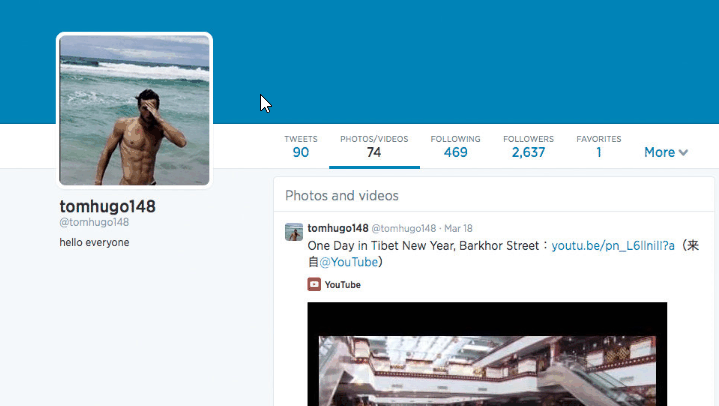Posing as hundreds of models, celebrities, and professionally-photographed schoolgirls, and displaying profile  descriptions taken from journalists, choreographers and other professionals, China has been caught using Twitter for a mass propaganda campaign aimed at spreading the Chinese government’s messages about Tibet, while Tibetans are denied free speech rights by the Chinese government.
descriptions taken from journalists, choreographers and other professionals, China has been caught using Twitter for a mass propaganda campaign aimed at spreading the Chinese government’s messages about Tibet, while Tibetans are denied free speech rights by the Chinese government.
The propaganda campaign was uncovered by Tibet rights group Free Tibet, working with the New York Times.
The fake profiles were composed of photographs of attractive Westerners, taken from professional photographers’ websites, commercial stock image libraries, and other internet resources, combined with profile descriptions taken from Western professionals, and have genuine followers.
The Chinese government’s messages on Tibet were spread through these accounts by means of copying messages from English-language Chinese websites that agree with the Chinese government, attacking the Tibetan spiritual leader the Dalai Lama, and portraying Tibet as a “contented and idyllic Chinese province,” according to Free Tibet.
The accounts were also used for other types of political spam, such as adding the word “Tibet” into unrelated tweets to drown out legitimate Tibet-related content on the internet.
The fake accounts also spread messages about other Chinese government interests, such as the ethnic unrest in Xinjiang.
Around 100 fake accounts have been identified, but Free Tibet suspects there to be hundreds more.
Free Tibet compiled a detailed report on the fake accounts, and submitted it to Twitter, urging Twitter to prevent abusive propaganda.
“A company of Twitter’s size and highprofile must take responsibility for failing to prevent abuse on this scale for the political purposes of an authoritarian regime,” wrote Free Tibet director Eleanor Byrne-Rosengren. “These accounts are an act of cynical deception designed to manipulate public opinion regarding an occupied and brutally repressed country.
“Tibetans within Tibet are completely denied the right to speak to the world online. They face even greater restrictions on their online activity than China’s own citizens and can receive sentences of up to life imprisonment for online or email content criticising China’s regime. China has the power and resources to use Twitter for its own ends and Tibetans do not. In the words of concentration camp survivor Elie Wiesel, ‘neutrality helps the oppressor, never the oppressed’.”
China has been ranked 175 our of 180 countries rated for press freedom by Reporters Without Borders in 2014.
The Chinese authorities in Tibet regularly cut off media communications after sensitive political events, such as Tibetan protests and Chinese government celebrations.
Chinese authorities have also taken more direct actions against Tibetans use of communications media, such as visiting internet cafes and monasteries and arresting Tibetans who had engaged in overseas calls. Tibetans have also been arrested for sharing photos or other information of protests. More familiarly, carrying photographs of Tibetans high spiritual leader, the Dalai Lama, who is considered a dangerous separatist by the Chinese government, is illegal, as is carrying recorded Tibetan songs.
Free Tibet has begun a campaign asking netizens to email Twitter about propaganda abuse.
By Day Blakely Donaldson
